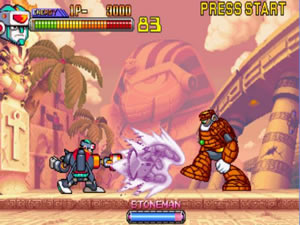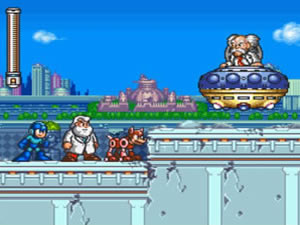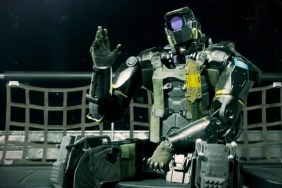Old, new, borrowed and blue.
Mega Man might be old, but he’s one tough little midget. Back in his heyday,
he ran through a gauntlet of action platformers, foiling the ever-nefarious
Dr. Wily and his band of unique henchmen over and over again. Unfortunately,
there was one recurring frustration with Mega Man: his adventures had become
too repetitive, each new game simply a mirror of the last.
In an ironic effort to keep the fading series fresh, Mega
Man is constantly being re-imagined. Over the past few years, we’ve
seen Mega
Man X, Mega Man Legends, Mega
Man EXE, Mega Man Zero, Mega Man
Soccer, and coming soon, a Mega Man RPG. Cripes! All
this for a robot-kid who didn’t learn how to duck until Mega
Man X5, some 20 games into the series? Rather than keep us interested,
this overbearing diversity is enough to make us long for the simple action of
the original games.
But
have heart, young gunners – Mega Man Anniversary Collection hops
aboard the time travel express and offers a nostalgic trip back to the classic Mega
Man games. Newcomers might not get misty-eyed, but even they can’t argue
with the value-minded price. The collection includes all the classic games, Mega
Man 1 through Mega Man 8, plus
two average fighting games never before released in the U.S.
For newbies who don’t know much about the series, Mega Man is a blue robot with
a heart of gold. In Japan, his name was Rock Man. His sister robot was named
Roll. Rock and Roll. Oh, the wit.
Anyway, Mega Man repeatedly fights against
Dr. Wily, a crazed inventor who fashions eight evil robots of various talents.
By beating these robots, Mega Man earns their weaponry, each of which is effective
against some other major baddie. Eventually, Mega Man throws down against Wily
in the evil scientist’s skull fortress. Wily gets whooped, promises to always be good, brush his teeth, and never again wrong the world’and
five seconds later, he does it again.
The good news is that there are no emulation problems in this collection – expect
perfect 8-, 16- and 32-bit recreations all the way. You jump, you shoot, you
gain new abilities, you jump and shoot some more. The games play just
as they did originally, which means they’re
still hard, fun and classic.
 That being said, some of the games are better than others. The original Mega
That being said, some of the games are better than others. The original Mega
Man was difficult and not particularly fun, and the same holds true today. Things pick up in Mega
Man 2, 3 and 4, where the series truly found its groove and defined itself as a top-notch platformer.
Much of that has to do with the robots. Some of them look sharp, like the wicked
Pharaoh Man and Snake Man, while others look improbably ridiculous, like the
moronic Clown Man. As is usually the case with a series that has stuck around
a little too long, the designs get less original and more far fetched as the
years pass. The best robot designs, unsurprisingly, are in Mega
Man 2, 3, and 4. With each new iteration,
you can see Dr. Wily losing it more and more. Flower Man? Top Man? Wily, please.
Really only a few changes have been made to the games and they’re very minor. The Navi remix mode that first appeared in Mega
Man 8 is now in every game, which overlays intermittent, non-invasive directional arrows to help keep you from going the
wrong way. Navi mode also replaces the original 8-bit midi tracks with actual instruments. The 8-bit versions still sound more fitting, but the remixes certainly aren’t a problem.
A new quicksave memory card system has been grafted over the old password
system, allowing easy automatic saves instead of the tedium of writing down all the grid information. Purists can still enter in the old passwords or start over if they die, however.
 The interface wrapping everything together is kind of neat as well; instead of a normal menu, Mega Man runs through doors marked with the various games and options. While superficially clever, much more could have been done with this. Why not a museum for Mega Man to wander through?
The interface wrapping everything together is kind of neat as well; instead of a normal menu, Mega Man runs through doors marked with the various games and options. While superficially clever, much more could have been done with this. Why not a museum for Mega Man to wander through?
It’s a little hard to quibble about “extras’ in a collection of this size, however. Mega
Man Anniversary Collection does include plenty of art and audio to unlock as well as the two unreleased fighting games, both of which are pretty bad. The PS2 also enjoys a Mega
Man cartoon episode.
For $30, there’s no cheaper way to re-experience Capcom’s mega-past. Though the
series is pretty much stale these days, that wasn’t always the case, and the Mega
Man Anniversary Collection serves as a reminder that while the games
might feel a little dated, the Blue Bomber still has some fight left.
-
A ton of game
-
Great price for the goods
-
Accurate emulation
-
Only really appeals to fans
-
Should have offered more interesting nostalgia







